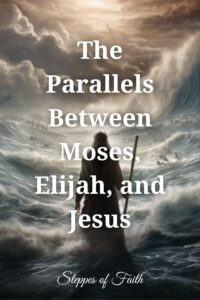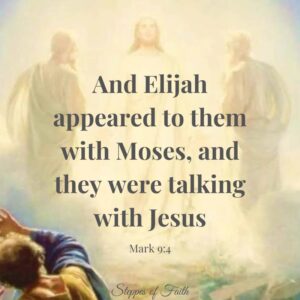
“And Elijah appeared to them with Moses, and they were talking with Jesus.” (Mark 9:4)
Matthew 17, Mark 9, and Luke 9 all record the moment of Jesus’ transfiguration on a “high mountain (most likely Mount Hermon on the Syria-Lebanon border).” As Peter, James, and John stare at a remarkably glorified Jesus, Elijah and Moses suddenly appear. Many people ask, “Why these two men? Why not Abraham or Noah or David?” These men were also surely worthy, but they were not.
Elijah and Moses appeared for two main reasons—as representations of the Old Testament and precursors of the coming Messiah.
Several times in the New Testament, we find the phrase “the Law and the Prophets.” One example is when Jesus proclaims the Greatest Commandment to the Pharisees.
“You shall love the LORD your God with all your heart, with all your soul, and with all your mind. This is the first and great commandment. And the second is like it: You shall love your neighbor as yourself. On these two commandments hang all the Law and the Prophets.” (Mt 22:37-40)
As representatives of the Old Testament, Moses is “the Law,” and Elijah is “the Prophets.” Anytime we read “the Law and the Prophets” (see also Mt 5:17, 7:12; Rom 3:21), it refers to these two men, specifically, and the Hebrew Bible (the Old Testament) in general.
The Jewish people highly rely on the Torah and Tanakh (the Old Testament), making the teachings of “the Law and the Prophets” foremost in their faith. But Jesus changed all that by implementing the New Covenant and its institution through His death and resurrection.
“Behold, the days are coming, says the LORD, when I will make a new covenant with the house of Israel and with the house of Judah. But this is the covenant that I will make with the house of Israel after those days, says the LORD: I will put My law in their minds and write it on their hearts. And I will be their God, and they shall be My people.” (Jer 31:31, 33; Heb 8:8, 10)
“The Law and the Prophets” is now written on the hearts of the Jewish people and every follower of Christ, not solely on paper, so no one is without excuse.
Signs and Wonders
Elijah and Moses are also precursors of Jesus. The Bible gives many different examples.
God appointed Moses and Elijah during terrifying times to be prophets tasked with calling for Israel to repent and turn from its idolatrous ways. Jesus’ birth occurred during a similar time when Israel’s religious leaders were consumed with keeping a strict, rigid societal structure under Roman rule, causing many to rebel from God.
Both Elijah and Moses also performed what the people perceived to be miracles. Unlike Jesus, who is God incarnate, Elijah and Moses could not perform miracles independently. Nevertheless, God performed miracles through them to achieve His purposes.
For Moses, God caused manna to fall from heaven as the Israelites wandered in the wilderness (Ex 16), water to pour from a rock (Num 20:7-11), and quail to fall from the sky for the people to eat (Num 11:31-33). God also provided a pillar of fire for warmth and protection during the night as the people journeyed to the Promised Land and a pillar of clouds for shade and guidance during the day (Ex 13:21).
For Elijah, God soundly defeated the prophets of Baal in a fire-making contest (1 Kings 18), provided an unending supply of flour and oil for a widow and her son during a time of famine (1 Kings 17:8-16), and raised another widow’s son from the dead (1 Kings 17:22). He also prophesied God’s prevention of rainfall (1 Kings 17:1) and then its resumption three years later after the people turned from Baal (1 Kings 18:41-46).
Both men performed many miracles through God’s power.
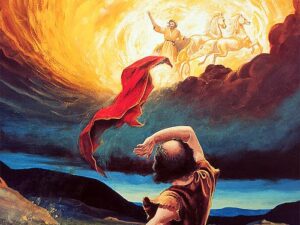
Elijah and Jesus
Elijah’s similarities to Jesus do not stop there. Another way is by how he and Jesus died, or, more accurately, did not die.
The gospels record that Jesus died on the cross and rose three days later. For Elijah, 2 Kings 2:11 says a chariot of fire suddenly appeared to separate Elijah from his protégé’ Elisha, and then Elijah was taken up in a whirlwind into heaven. The Bible records that the only other person who never experienced death besides Jesus was Enoch in Genesis 5. Enoch was spared because he “walked with God.”
“So, all the days of Enoch were three hundred and sixty-five years. And Enoch walked with God; and he was not [i.e., he did not die], for God took him.” (Genesis 5:23-24, my addition)
Additionally, before Elijah or Jesus died, they ensured their followers would do great things.
Upon God taking Elijah up in a whirlwind, He gave Elisha a double portion of Elijah’s spirit. Elisha’s request was not to succeed Elijah in his ministry, which God had already assured (1 Kings 19:16-21), nor to be superior to Elijah. His request was for God to grant Elijah’s spiritual power so that it would go beyond his own capabilities and make him a good prophet. Elisha went on to be a great prophet, indeed, who performed twice as many recorded miracles as Elijah.
Similarly, Jesus promised believers that they also would do great things, namely, becoming witnesses to the world about the truth of the gospel. From humble beginnings with the early church over 2,000 years ago, Christianity remains the most popular religion in the world.
“Most assuredly, I say to you, he who believes in Me, the works that I do, he will do also. And greater works than these he will do because I go to My Father.” (John 14:12)
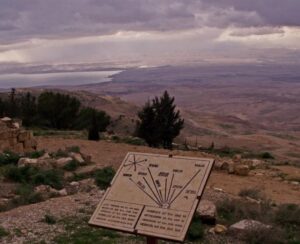
View from Mount Nebo, Israel
Moses and Jesus
Moses died before he entered the Promised Land. However, out of His great blessing, God Himself buried him on Mount Nebo in Moab so that his gravesite would remain unknown (Deut 34:6). Even so, Moses was arguably more of a precursor of Jesus than Elijah.
In addition to preaching repentance and performing miracles, Moses repeatedly talked to God in person (Ex 33:11, 34:29-35), just as Jesus did. Elijah did, too, but he did not have the intimate relationship with God as Moses or Jesus did.
Moses’ relationship with God was so close that he dared ask if he could see God’s glory, which God obliged (Ex 33:18). The experience was so powerful that Moses descended Mount Sinai in a similar glow to Jesus’ transfiguration (Ex 34:29-30). Elijah also experienced God’s presence, but he did not ask to see it; God offered it to comfort his prophet (1 Kings 19:11-12).
[READ MORE: How God Reveals His Shekinah Glory]
Like Jesus, Moses was also forced to deal with people who rejected his teaching. Despite Moses’ diligent efforts, the Israelites were continually forgetful and rebellious (Ex 16:2-3; Num 11:1-2, 20:3-5), even going as far as refusing to enter the Promised Land (Num 14:1-3). Jesus dealt with similar issues. Many of the Jewish people were unwilling to receive Him (Jn 1:11) and refused to accept the truth of His words.
Finally, Moses repeatedly interceded for the people as Jesus did and still does (Rm 8:34; Heb 7:25; 1 Jn 2:1). Moses even offered his life to save the people. In response to the Israelites creating a golden calf while he was on Mount Sinai with God, receiving the Ten Commandments, Moses offered to take their punishment.
“Then Moses returned to the LORD and said, “Oh, these people have committed a great sin and have made for themselves a god of gold! Yet, now, if You will forgive their sin—but if not, I pray, blot me out of Your book which You have written.’” (Ex 32:31-32)
God spared Moses and the Israelites, but He did not spare His own Son. Jesus willingly laid down His life to save us all from the penalty of sin, which is death and eternal torment.
“No one takes it from me, but I lay it down of my own accord. I have authority to lay it down and authority to take it up again.” (John 10:18)
“For God so loved the world that He gave His only begotten Son, that whoever believes in Him should not perish but have everlasting life.” (John 3:16)
Waiting for Moses and Elijah
Moses and Elijah were such good precursors that the Jewish people have watched for their return for thousands of years. They understand from rabbinic teaching that God will raise up a great prophet before the Messiah’s coming, which they assumed would be either Moses or Elijah. Mostly, they are looking for Elijah based on the prophecy in the book of Malachi.
“Behold, I will send you Elijah the prophet before the coming of the great and dreadful day of the LORD.” (Malachi 4:5)
The prophecy is why the temple priests asked John the Baptist in John 1:19-23 if he was either Moses or Elijah.
“Now this is the testimony of John [the Baptist] when the Jews sent priests and Levites from Jerusalem to ask him, ‘Who are you?’
“He confessed, and did not deny, but confessed, ‘I am not the Christ.’
“And they asked him, ‘What then? Are you Elijah?’
“He said, ‘I am not.’
“’ Are you the Prophet [Moses]?’
“And he answered, ‘No.’
“Then they said to him, ‘Who are you, that we may give an answer to those who sent us? What do you say about yourself?’
“He said, ‘I am the voice of one crying in the wilderness. Make straight the way of the LORD, as the prophet Isaiah said.’”
Malachi’s mention of Elijah was to announce the coming of the Messiah, which Elijah did during his ministry in 1 Kings. Scholars believe he may also announce the Messiah’s second coming during the Tribulation as one of the two witnesses in Revelation 11:1-3, but Scripture does not make this clear.
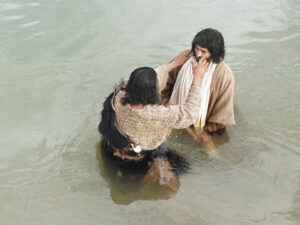
Recognizing Moses and Elijah
What is clear is that John the Baptist embodied Elijah’s spirit as “the one crying in the wilderness (Is 40:3)” and the messenger who will “prepare the way before Me (Mal 3:1).” John fulfilled that role and not Elijah as we see when Jesus arrived to be baptized by John (Jn 1:29-34; Mt 3:13-17; Mk 1:9-11; Lk 3:21-22).
Based on Malachi’s prophecy and rabbinic tradition, the Jewish people continue to expect Moses’ or Elijah’s reappearance to announce the Messiah’s coming. Sadly, their eyes remain blind to the fact that He’s already been here and died on the cross for them over 2,000 years ago. However, they will have another chance in the last days of the Tribulation (Rev 14: 1-5)
We cannot put Elijah and Moses on the same plane as Jesus, the Son of God, yet the Bible tells us they share parallel qualities and backgrounds. Therefore, we must recognize how they paved the way for us to identify the Messiah Jesus any time we read about them in the Old Testament.
